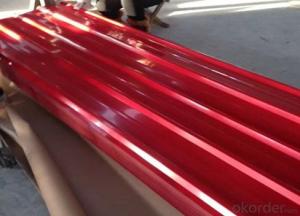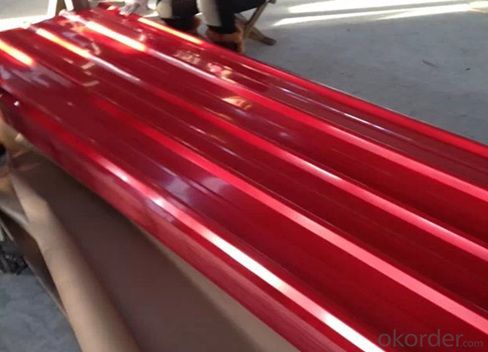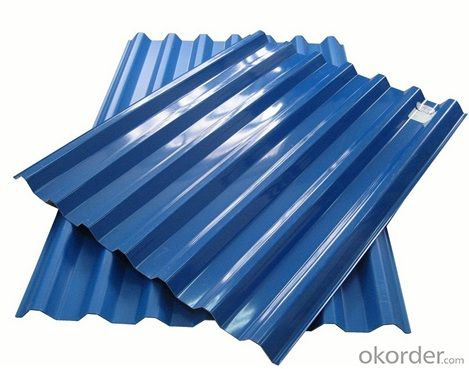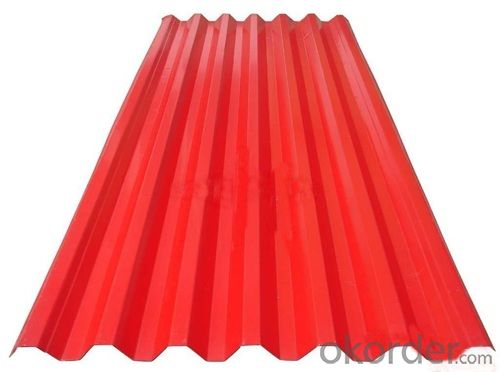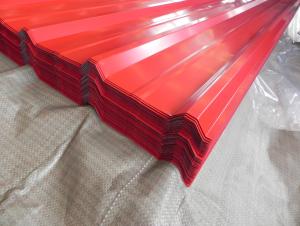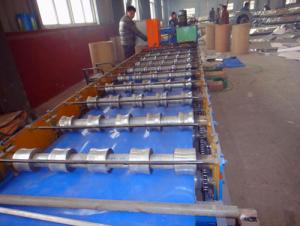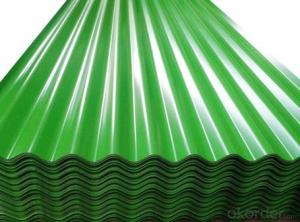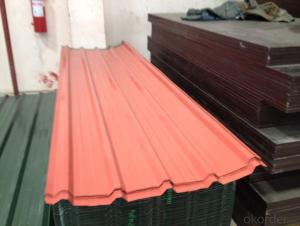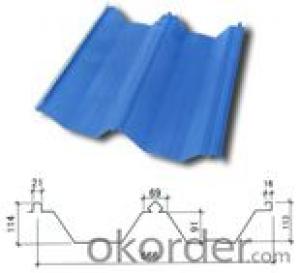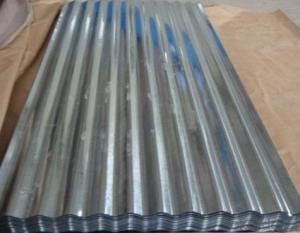COLORED CORRUGATED STEEL SHEET FOR ROOFING
- Loading Port:
- Tianjin
- Payment Terms:
- TT OR LC
- Min Order Qty:
- 25 m.t.
- Supply Capability:
- 10000 m.t./month
OKorder Service Pledge
OKorder Financial Service
You Might Also Like
Specification
Product Brief Introduction
COLORED CORRUGATED STEEL SHEET FOR ROOFING
--- Corrosion resistance: Pre-coated steel offers excellent corrosion resistance achived through continuous hot DIP galvanization and corrosion resistant primer/polyester coating. Protection is achieved when zinc and steel are together in the presence of moisture; The zinc protects the steel by galvanic action
Product Features
. Traditional aesthetics outlook
. Suitable for new house or renovation.
. Less joints, watertight
. Long life service
. Tedun also provide relative ridge cap, fasteners and other accessories
Product Specification
Standard:ASTM, GB,JIS,JIS G3302 ASTM 755 EN10169
Grade: DX51D CGCC CS
Thickness: 0.13mm~3.0mm,
Width: 1250,600-1250mm
Coil weight:3-12 MT
Coil ID:508/610mm
Chemical composition:
C | Si | Mn | Cr | Ni | P | S |
0.150 | 0.476 | 11.231 | 12.50 | 0.900 | 0.039 | 0.010
|
FAQ
How long will we receive the goods ?
45days after receiving workable L/C
how do you control the quality ?
we have our own quality control department ,we will arrange QC person to see the production line ,when goods finish ,before shipment ,our QC person will check the quality as per our test report request ,if the goods is ok ,then we issue the test report ,and we allow the goods shipping ,otherwise will not allow ship the goods.
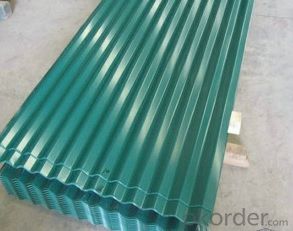
- Q: Are steel sheets suitable for oil and gas industry applications?
- Yes, steel sheets are suitable for oil and gas industry applications. Steel sheets offer high strength, durability, and resistance to corrosion, making them ideal for various uses in the oil and gas industry such as pipelines, storage tanks, and offshore platforms. Additionally, steel sheets can withstand extreme temperature and pressure conditions, making them a reliable choice for these applications.
- Q: What is the average weight of steel sheets per square foot?
- The average weight of steel sheets per square foot can vary depending on the specific type and thickness of the steel. However, as a rough estimate, it is typically around 40 to 50 pounds per square foot.
- Q: Are steel sheets resistant to impact or damage?
- Steel sheets possess remarkable strength and durability, attributes that render them exceptionally resistant to impact and damage. Their robust tensile strength enables them to endure substantial loads and withstand external forces without deformation or breakage. Thus, they find extensive use in critical applications that demand impact resistance, such as construction, automotive manufacturing, and industrial settings. Furthermore, steel sheets exhibit exceptional resilience against extreme temperatures, corrosion, and environmental factors, further enhancing their overall resistance to damage. However, it is worth noting that the degree of impact or damage resistance may vary depending on the thickness, quality, and composition of the steel sheet.
- Q: The difference and usage of color steel sandwich panel and color profiled steel sheet
- The wall of the project is made of type 950 rock wool wall sandwich board, and the roof is made of type 960 rock wool roof sandwich board
- Q: Can the steel sheets be cut easily?
- Yes, steel sheets can be cut easily using various cutting methods such as shearing, plasma cutting, laser cutting, or mechanical sawing depending on the thickness and type of steel.
- Q: What is the typical coefficient of thermal expansion of a steel sheet?
- The typical coefficient of thermal expansion of a steel sheet is around 10.8 x 10^-6 per degree Celsius.
- Q: Are steel sheets suitable for elevator doors?
- Yes, steel sheets are suitable for elevator doors due to their durability, strength, and ability to withstand wear and tear.
- Q: Are steel sheets resistant to staining or discoloration?
- Yes, steel sheets are generally resistant to staining or discoloration due to their inherent corrosion-resistant properties.
- Q: Can steel sheets be used in the energy sector?
- Yes, steel sheets can be used in the energy sector. Steel is a versatile material that offers several advantages for various applications in the energy industry. It is commonly used in the construction of power plants, transmission towers, and infrastructure for renewable energy sources such as wind turbines and solar panels. In power plants, steel sheets are used in the fabrication of boilers, turbines, and other components. Steel's high strength and durability make it suitable for withstanding the high temperatures and pressures involved in power generation processes. It also offers resistance to corrosion and erosion, ensuring the longevity of critical equipment. Steel sheets are also utilized in the construction of transmission towers and substations. These structures support power transmission lines and facilitate the efficient flow of electricity across long distances. Steel's strong mechanical properties make it an ideal choice for these applications, as it can withstand the weight and stresses imposed by power transmission infrastructure. Furthermore, steel sheets are vital in the manufacturing of wind turbines and solar panels. In wind turbines, steel is used for the tower structure, which must be strong enough to support the weight of the rotor and withstand the loads from wind forces. Additionally, steel sheets are used in the construction of solar panel frames, providing rigidity and stability for the photovoltaic modules. Overall, steel sheets are widely used in the energy sector due to their strength, durability, and resistance to various environmental factors. The versatility of steel makes it a reliable choice for a range of applications, helping to support the generation and transmission of energy in both conventional and renewable energy sources.
- Q: Are the steel sheets suitable for solar panel mounting?
- Yes, steel sheets are suitable for solar panel mounting. They provide strong support and durability, making them an ideal choice for securely mounting solar panels on various surfaces.
Send your message to us
COLORED CORRUGATED STEEL SHEET FOR ROOFING
- Loading Port:
- Tianjin
- Payment Terms:
- TT OR LC
- Min Order Qty:
- 25 m.t.
- Supply Capability:
- 10000 m.t./month
OKorder Service Pledge
OKorder Financial Service
Similar products
Hot products
Hot Searches
Related keywords
